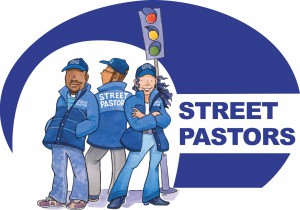 Tricia has been coordinator of Sheffield Street Pastors for about 5 years. All of the Street Pastors are Christians who have a genuine concern for their communities and are volunteers from local churches. After a comprehensive training course, teams go out at night to engage with people where they are, on their ground and on their terms. The Street Pastors are not about preaching but about practical demonstrations of the love of God. Their main role is to make themselves available to Care, Listen and offer practical Help to whoever they meet, especially young and vulnerable people.
Tricia has been coordinator of Sheffield Street Pastors for about 5 years. All of the Street Pastors are Christians who have a genuine concern for their communities and are volunteers from local churches. After a comprehensive training course, teams go out at night to engage with people where they are, on their ground and on their terms. The Street Pastors are not about preaching but about practical demonstrations of the love of God. Their main role is to make themselves available to Care, Listen and offer practical Help to whoever they meet, especially young and vulnerable people.
Rev Les Issac started Street Pastors about 11years ago. He decided that churches were not doing enough about the increasing crime rate and the dramatic rise in the numbers of teenagers carrying and using knives and guns in his area of London. Eighteen people went out into the area and listened, cared and helped. There are now around 10,000 volunteers and the movement has spread abroad.
In 2009 in the Burngreave area of Sheffield, which was known to have a gun and knife culture, a gang member was executed in the park. In 2010 in response, Burngreave Street Pastors was set up, with backing of the Police, the Council and the Churches. Teams of four volunteers, each with two men and two women, representing different churches and different ethnic groups, went out into the community and got involved in lots of things. They made connections with shopkeepers and other people in the area, made a good impression and gained a good reputation.
In 2011 a city centre team was set up to cover Sheffield centre. John, a member of the city centre team, gave us an idea of what a typical night might be. The team covers the area around the Peace Gardens to Charter Square to Carver Street and West Street from 10.30 pm to 4.00 am on Friday and Saturday nights. There are around 20 clubs and pubs in the area, some with a capacity in excess of 700. One doorman, who, using a ‘clicker’, counted the people entering his club, said that 1022 had entered that evening. The Sheffield night-time economy is worth about 10% of all the jobs in Sheffield.
Each volunteer has a heavy waterproof coat, a cap and gloves. The kit costs around £300 and volunteers find the money themselves. The cap must be worn at all times for insurance purposes. It is easily seen in a crowd and by CCTV cameras. John has a rucksack that contains bottles of water, first aid kit, space blankets, torches, flip-flops and three kinds of lollipop. The lollies are ‘ice-breakers’. They are offered to many people to make a friendly introduction. Apparently the doormen at many of the pubs and clubs love them! So do many of the girls and boys on a night out. People talk much more easily to volunteers at night than they would in daylight, perhaps relaxed by having had a couple of drinks.
The flip-flops are offered to girls who started the evening wearing high-heeled shoes and by 1.00 a.m. can hardly walk and have had to take them off. They are often walking bare-foot on pavements that are ice cold and sometimes strewn with broken glass. The offer of flip-flops is many times greeted with a scream of relief and a hug!
There are often lots of banter and questions like, “Is Street Pasta something to do with spaghetti?” The most common question is, “How much are you paid?” The answer is, “Nothing. We’re volunteers.” The next question is, ”Why do you do it, then?” “We believe God loves us and we want to help people to enjoy themselves and have a good, safe night out.”
John said that they walk very slowly from the Peace Gardens to West Street to be seen and give an opportunity to be spoken to. They pick up bottles when they see them, because a bottle can be a dangerous weapon if a fight starts.
They work alongside the police but are not an arm of the police. They contribute to the local economy because they often pick up vulnerable people when normally the police would be called to deal with them. The Street Pastors have radios and can contact police and ambulances and they carry dicta-phones to keep a note of who they speak to. If they find anyone who needs help because of too much drink and they put them in a taxi, they take note of the taxi number to ensure the persons safety.
One club closes at 3.00 a.m. and makes people leave whatever state they are in. Often volunteers find someone lying on the pavement, incapable. They wrap them in the space blankets and call the paramedics. They often give out space blankets to warm up (silly) thinly clad girls.
The final shot from the speaker was that city centre crime and anti-social behavior has fallen by 39% on Friday and Saturday nights when the Street Pastors are working.
The consensus of opinion in the Probus Club was that these Street Pastors are special people, doing a voluntary job that few of us would tackle.
We were full of admiration for them.
